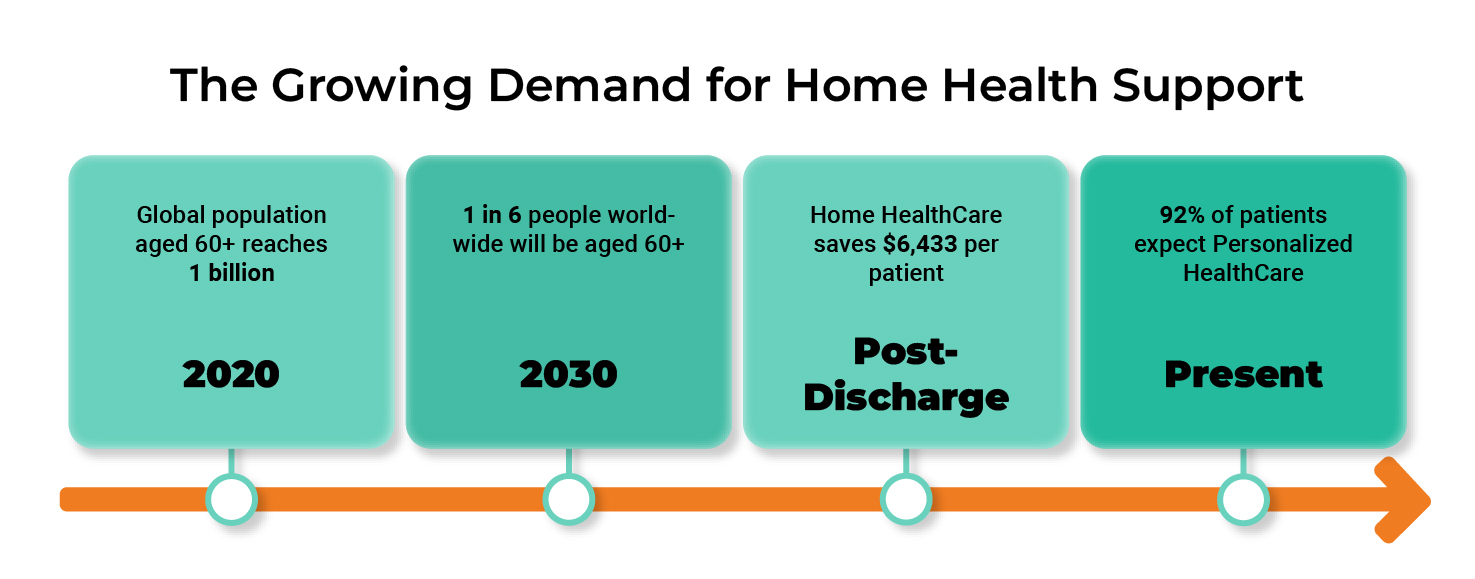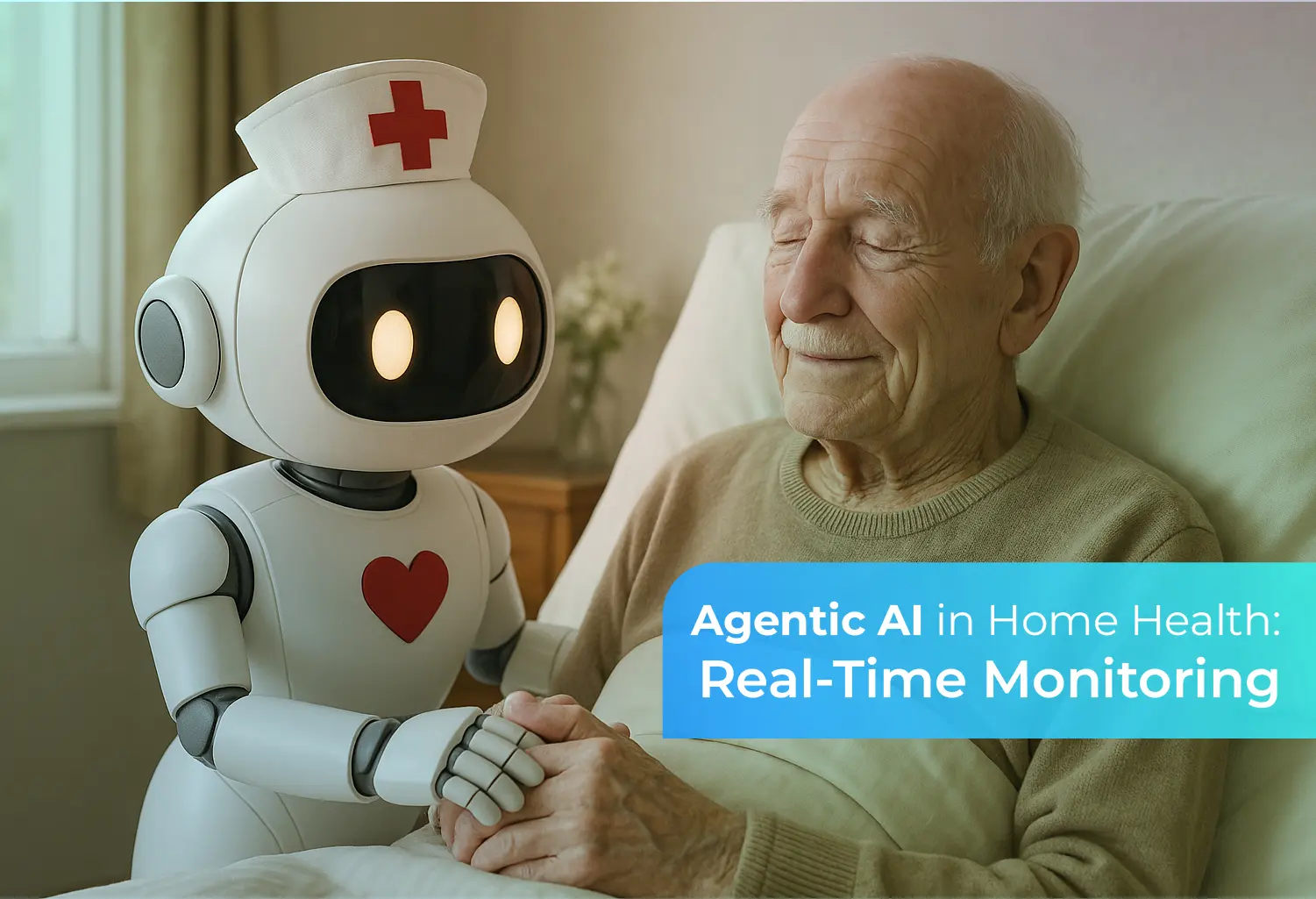Home health is having its moment—but are we ready for what’s next?
In the rush to meet growing demand, many agencies are feeling the pressure: burned-out staff, sky-high compliance demands, and documentation overload. The reality? The future of home healthcare is arriving faster than our systems can keep up.
Home health is no longer a side note in healthcare delivery—it’s the fastest-growing care segment globally. Driven by an aging population, post-pandemic care preferences, and rising costs of institutional healthcare, more patients are opting to receive care where they’re most comfortable: at home.
But here’s the catch—this boom comes with its challenges. Agencies are scrambling to balance staff shortages, regulatory compliance, rising documentation demands, and patient expectations.
It’s time to enter the era of Agentic AI in Home Health and embrace Home Health Automation Solutions that are proactive, intelligent, and scalable.
The Evolution of Home Health Support
Home healthcare isn’t just expanding—it’s exploding. The global home healthcare market is expected to soar to $839 billion by 2030, growing at a steady CAGR of 7.9% since 2022. What’s fueling this rapid growth?
The shift to AI-Driven Home Health Solutions that can support both patients and caregivers in smarter, faster, and more predictive ways.

What Is Agentic AI in Home Health?
Agentic AI in Home Health refers to AI systems that are goal-driven, autonomous, and capable of taking initiative. Think of it as the next-gen AI that can manage processes without being micromanaged. It can learn from outcomes, adapt in real-time, and collaborate with humans to achieve strategic objectives.
Stat to consider:
According to a 2024 Deloitte report, 62% of healthcare leaders say they plan to implement Agentic AI in care delivery or operational workflows by 2026.
This growth is driven because in sectors like home health, where agencies juggle rising patient loads, credential management in home care, documentation demands, staffing shortages, and compliance pressures, Agentic AI in home health delivers what legacy tools can’t: agility, intelligence, and automation that thinks.
From proactively adjusting care plans based on real-time patient data to automating complex documentation and regulatory tasks, Agentic AI in home health enables teams to do more with less stress. It’s not just about replacing manual work—it’s about amplifying human care with digital precision.
From adjusting care plans to managing billing to improving compliance, AI Home Health Assistants are helping agencies scale care delivery without scaling burnout.
Agentic AI in Home Health Applications & Use Cases
Agentic AI in home health offers a transformative leap forward in automating tasks and proactively managing care, operations, and quality. Here’s how Agentic AI is reshaping the home health landscape across key workflows:
-
Clinical Workflow Management
Clinical care in home health is dynamic—patients’ needs shift daily, caregivers call in sick, and visit urgencies change on the fly. Traditional scheduling tools and rule-based systems can’t keep up.
AI-driven home health automation solution brings real-time intelligence to care delivery. It continuously evaluates caregiver availability, patient acuity, geographic proximity, and urgency of visits to optimize schedules for efficiency and clinical impact.
Real-World Example:
A patient with congestive heart failure reports shortness of breath in a remote patient monitoring app. Agentic AI reassigns a nearby nurse for an urgent visit, reschedules a less critical appointment, updates the care plan in the EHR, and alerts the care manager—all in minutes. -
Dynamic Care Planning & Coordination
Home care isn’t static, and care plans shouldn’t be either. Agentic AI-driven home health monitoring enables care plans to evolve dynamically in response to real-time patient data, caregiver feedback, and interdisciplinary input.
Unlike rigid templates, home health automation solutions can connect the dots between clinical trends, behavioral cues, and documentation gaps to suggest care plan adjustments that improve outcomes.
Real-World Example:
A wound care patient’s healing progress slows. Intelligent virtual agents for elder care notice a pattern in visit notes, reduce intervals between dressing changes, and recommend a consult with a specialist—all while notifying the whole care team via secure messaging.
The result? More coordinated, responsive care and fewer preventable hospitalizations.
-
Documentation & Compliance
Documentation remains one of the top burnout factors for home health staff. Agentic AI eliminates the burden of repetitive, manual charting by auto-generating visit summaries, filling in missing details, and validating compliance in real time.
It doesn’t just document what happened—it ensures that home care documentation is audit-proof, complete, and compliant with CMS, EVV, and payer standards.
Real-World Example:
After a caregiver completes a home visit and checks out through an EVV system, Agentic AI for home health agents generates a SOAP note, populates required fields, embeds the relevant vitals from the patient’s wearable device, and flags two documentation gaps with suggested text, cutting charting time by 70%.
-
Revenue Cycle Management (RCM)
Healthcare revenue cycle automation is no longer a luxury—it’s a survival strategy. With AI-driven home health solutions, healthcare claims are already improving cycle times. Agentic AI takes it a step further by proactively spotting errors, preventing denials, and optimizing reimbursement strategies.
Real-World Example:
Agentic AI identifies that claims involving a specific ICD-10 code frequently get denied due to insufficient documentation. It alerts billing staff, recommends the missing documentation, and pre-validates new claims before submission, boosting first-pass acceptance rates and accelerating cash flow.
The fusion of Insurance claims RPA and intelligent decision-making means fewer write-offs and more time spent on patient care.
-
Quality Measurement & Reporting (OASIS)
CMS star ratings and quality benchmarks can improve an agency’s reputation. Agentic AI in home health supports automated medical claims processing and reporting by detecting inconsistencies, autofilling forms like OASIS, and identifying potential issues before submission.
Real-World Example:
While completing an OASIS assessment, Agentic AI flags that two entries contradict past notes—specifically, a patient marked “independent” today was listed as “requires assistance” last week. It prompts clarification and ensures the report aligns with CMS standards, protecting star ratings and reimbursement.
-
Staff Training & Development
High turnover is one of home health’s most significant challenges. With healthcare revenue cycle automation and staff workflows becoming more digital, onboarding needs to be smarter—not longer.
AI Home Health Assistants identifies skill gaps, burnout indicators, and knowledge trends based on documentation quality, care notes, and workflow bottlenecks. It then delivers personalized micro-training at optimal times.
Real-World Example:
Suppose a caregiver repeatedly misses documentation fields on wound care visits. Agentic AI detects the trend and automatically assigns a 10-minute mobile tutorial on accurate wound documentation during a break, improving accuracy without disrupting patient care.
-
Predictive Analytics for Home Healthcare
Predictive analytics for home healthcare can accurately forecast risk by analyzing thousands of data points—vitals, visit patterns, environmental conditions, and patient behavior—to spot early signs of decline or disengagement.
This allows care teams to act before issues escalate.
Real-World Example:
A senior patient with arthritis begins skipping exercises, logging low sleep quality, and expressing fatigue in visit notes. Agentic AI predicts increased fall risk and recommends an additional check-in visit and a physical therapy reassessment, avoiding a potential emergency.
Final Takeaway: Time to Think Bigger with AI
Agentic AI in home health isn’t just the next step in automation—it’s a strategic leap for home health agencies looking to stay ahead of rising demand, regulatory complexity, and workforce burnout.
By applying intelligence to every layer of operations—from documentation to care coordination—Agentic AI enables teams to do more with less, better, and faster.
And as the global home healthcare market continues its explosive growth toward $839 billion by 2030, those leaders who adopt AI-driven home health solutions and invest in intelligent virtual agents for elder care like Agentic AI today will be the leaders of tomorrow.
Frequently Asked Questions (FAQs)
AI home health assistants are intelligent agents that help with medication reminders, symptom tracking, and caregiver alerts, improving patient engagement and reducing staff load.
Start with small use cases like documentation or visit scheduling. Look for solutions with AI home health assistants, EHR integration, and predictive tools.
